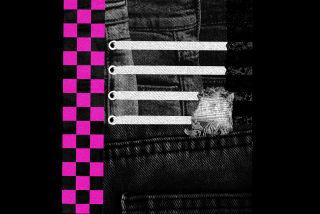Revenge of the geeks
- Share via
Many popular students approach graduation day with bittersweet nostalgia: excitement for the future is tempered by fear of lost status. But as cap-and-gown season nears, let’s also stop to consider the outcasts, students for whom finishing high school feels like liberation from a state-imposed sentence.
In seven years of reporting from American middle and high schools, I’ve seen repeatedly that the differences that cause a student to be excluded in high school are often the same traits or skills that will serve him or her well after graduation.
Examples abound: Taylor Swift’s classmates left the lunch table as soon as she sat down because they disdained her taste for country music. Last year, the Grammy winner was the nation’s top-selling recording artist.
Students mocked Tim Gunn’s love of making things; now he is a fashion icon with the recognizable catchphrase “Make it work.”
J.K. Rowling, author of the bestselling “Harry Potter” series, has described herself as a bullied child “who lived mostly in books and daydreams.” It’s no wonder she went on to write books populated with kids she describes as “outcasts and comfortable with being so.”
For many, says Sacred Heart University psychology professor Kathryn LaFontana, high school is the “first foray into the adult world where [kids] have to think about their own status.” And for teenagers, says LaFontana, who studies adolescent peer relationships and social status, “the worst thing in the world is to be different from other people; that’s what makes someone unpopular.”
In the rabidly conformist school environment, the qualities that make people different make them targets. In adulthood, however, the qualities that make people different make them compelling.
Some students are vaguely aware of this reality. An eighth-grade boy in Indiana told me: “I’m always single, so it’s tough. Never can get a girl. The smart thing repels girls. I like being smart because I breeze through school…. That’s the good thing, but the girl thing is killing me.”
It’s hard to know when you’re in high school that “the smart thing” is likely to translate into later success, or that “the girl thing” is bound to improve. That’s why it’s up to adults to convey constantly to teenagers that the characteristics that marginalize them can pay off after graduation.
Geeks profit from their technological knowhow. Emos benefit from being empathetic and unafraid to display emotion. Skaters, punks and others who pursue their arts with fervor benefit from the creativity they’ve honed. Gamers have learned both problem-solving skills and the ability to collaborate through collective intelligence.
In the adult world, being out is in. “Geek chic” and “nerd merch” are on the rise. Nerdcore hip-hop artists have penetrated mainstream consciousness. And the nerd prom known as Comic Con draws high-profile celebrities and throngs of smitten fans. They’re all part of what Jerry Holkins, creator of the Penny Arcade webcomic and video game conference, calls “the social pariah outcast aesthetic.”
Adults tend to be mature enough to recognize that there would be no progress — cures for diseases, ways to harness new energy sources — without people who are different. Successful scientists think distinctively.
So what happens to high school’s popular students? Research shows that they are more likely than outsiders to conform, which can also mean they’re less likely to innovate. They are more likely to be both targets and instigators of aggression — whether physical or relational, which includes rumors, gossip and backstabbing. They are more likely to drink and engage in other risky behaviors. Students who are popular and involved in aggression are less likely to do well in school. Psychologists point out that high-status cliques teach the exclusionary behavior that may be the foundation for eventual racism, anti-Semitism, sexism and other forms of bigotry.
That’s not to say, of course, that popularity in high school necessarily leads to mediocrity or worse in adulthood. But neither is there necessarily something wrong with a student merely because he is excluded by classmates. We don’t view a saxophonist as musically challenged if he can’t play the violin. He’s just a different kind of musician. A sprinter is still an athlete even if she can’t play basketball. She’s a different kind of athlete. Similarly, we might acknowledge that students who don’t follow the popular crowd’s lead aren’t any less socially successful; they’re just a different kind of social.
The education landscape would be so much more bearable if students could understand this. And if schools found better ways to nurture kids who reject the in-crowd image.
The worst aspect of the treatment of student outsiders isn’t the name-calling. It isn’t the loneliness. It isn’t even the demise of attitudes and programs that are important for fostering creativity and independence. The most heartbreaking consequence of this treatment is that tens of thousands of students — imaginative, interesting, impressionable people — think that they have done or felt something wrong.
It’s not enough to merely tell them that in the real world, “it gets better.” They need to know before graduation that being different is not a problem but a strength.
Alexandra Robbins is the author of “The Geeks Shall Inherit the Earth: Popularity, Quirk Theory, and Why Outsiders Thrive After High School.”
More to Read
A cure for the common opinion
Get thought-provoking perspectives with our weekly newsletter.
You may occasionally receive promotional content from the Los Angeles Times.






